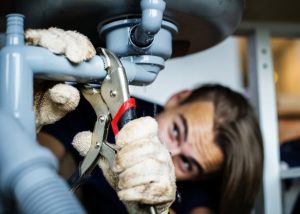We have noticed this post involving Detecting hidden plumbing leaks below on the internet and thought it made good sense to talk about it with you over here.

Early detection of dripping water lines can minimize a prospective disaster. Some little water leakages may not be visible.
1. Examine the Water Meter
Every residence has a water meter. Inspecting it is a surefire manner in which aids you find leakages. For starters, switch off all the water sources. Guarantee no person will purge, use the tap, shower, run the washing equipment or dishwashing machine. From there, most likely to the meter as well as watch if it will certainly alter. Because no person is using it, there must be no activities. If it moves, that indicates a fast-moving leakage. Also, if you identify no changes, wait an hour or more and also check back once again. This means you might have a slow leakage that might also be below ground.
2. Inspect Water Intake
If you detect abrupt modifications, despite your usage being the same, it suggests that you have leaks in your plumbing system. An unexpected spike in your bill indicates a fast-moving leakage.
A stable boost every month, also with the very same habits, shows you have a slow leak that's additionally gradually rising. Call a plumber to extensively examine your home, specifically if you really feel a cozy location on your flooring with piping underneath.
3. Do a Food Coloring Examination
When it involves water intake, 30% originates from bathrooms. Test to see if they are running properly. Decline flecks of food shade in the tank and also wait 10 mins. If the shade in some way infiltrates your bowl during that time without flushing, there's a leak between the storage tank and dish.
4. Asses Outside Lines
Don't fail to remember to check your outside water lines also. Must water seep out of the link, you have a loosened rubber gasket. One little leak can throw away bunches of water and also surge your water costs.
5. Analyze the scenario as well as examine
Property owners ought to make it a routine to check under the sink counters and also inside cupboards for any type of bad odor or mold and mildew development. These 2 warnings indicate a leak so timely focus is needed. Doing routine examinations, even bi-annually, can save you from a major issue.
Check for stainings and also weakening as many devices as well as pipelines have a life expectancy. If you believe leaking water lines in your plumbing system, don't wait for it to escalate.
Early detection of dripping water lines can alleviate a potential calamity. Some tiny water leaks may not be visible. Inspecting it is a proven way that assists you uncover leakages. One tiny leak can squander tons of water and also spike your water expense.
If you believe dripping water lines in your plumbing system, don't wait for it to intensify.
5 Signs that Your Home Has a Hidden Leak
Your water bill is unusually high without explanation
Generally, your water bill tends to stay consistent throughout the year as long as the same number of people live in your household year round. The bill might be higher during certain times of the year, such as summer, when your lawn may require more watering than it does in cooler months. However, if you notice a rise in your water bill that you can’t explain, it’s an indicator that there’s a hidden leak somewhere in your home.
You hear running water
One of the biggest signs that you have a water leak is the sound of rushing water when no plumbing fixtures are on and when no water-using appliances are running. If you hear running water in your walls when no water is being used anywhere in your home, locate your home’s main water shut-off valve, shut off your water supply, and contact a plumber at once.
Your home smells musty
Hidden leaks often occur in dark spaces, such as behind walls or under carpeting. Incidentally, darkness and moisture can create an ideal breeding environment for mold or mildew. If you start to smell mildew or the scent of rotting wood or stagnant water around your home, it’s a fair bet that a leak is the culprit.
You find wet spots around your home
The wet spots usually show up as moist areas in your carpeting. If your home has a basement level, puddles on the floor could indicate a slab leak. Outside, unexplainable puddles or lush, green patches in your yard often mean that there’s a leak in your sewer line or main water line.
You have stains, bubbles, or condensation on your walls/ceiling
Stains or condensation on your walls or ceiling are both major signs of a hidden leak. Also, drywall (AKA. sheetrock) is very absorbent, and as it takes on more water from a leak behind a wall, it will start to bubble, swell, or warp. If you see this happening in your home, don’t wait to contact a plumber before the water damage spreads.
https://www.ezflowplumbingaz.com/blog/2019/june/5-signs-that-your-home-has-a-hidden-leak/

I came across that piece about Hacks to detect leaks while browsing on the internet. Make sure you take the opportunity to promote this blog post if you enjoyed reading it. I enjoy reading our article about Top leak detection hacks.